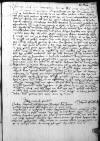Litterae Generositatis Vestrae erunt mihi gratissimae, cum quia eas longo iam tempore non viderim, tum etiam, quia benevolentiae et amoris in me vestri clara ferebant indicia. Habeo vobis gratias, quas possum, quod utique per tot tempora et locorum intercapedines me non obliviscitur. Petitis, ut vobis quae hic aguntur uberius describerem, nec tamen taedio legendi afficeremini, complectar brevibus. Hactenus ⌊imperatorem⌋ fastidiose hic opperiebamur cum magnis omnium impensis et sumptu, et hactenus nobis verba data sunt. Pridie tamen, compositis omnibus rebus, ⌊cardinalis Gurcensis⌋ hinc ab iis ⌊regibus⌋ amicabiliter solvit, qui ⌊imperatorem⌋ ad quartum ab hinc lapidem circa ⌊Prugk⌋ oppidulum ferre debet. Ibi omnia confecta confirmari debent tractabiturque ibidem, si necesse erit, nec ne, quod ⌊reges⌋ isti ⌊Viennam⌋ ire debent. Si in hoc conventu in ⌊Prugk⌋ res possunt componi, vix credo ⌊regem⌋ nostrum iturum ⌊Viennam⌋, et sic spes nobis est redeundi proximior, quam antea. Res Prutenae in hunc modum compositae sunt, quod ⌊magister generalis⌋ tenebitur et debet ⌊regi nostro⌋ praestare homagium et omnia in pace perpetua contenta servare. Hic tamen, ne conditio immutata, quod ⌊Poloni⌋ in ordinem recipi non debent, et auxilium, quod contra infideles ⌊magister⌋ ⌊regi⌋ ferre tenetur. Etiam habet quoddam moderamen. Sunt hic multi ⌊Germani⌋, quibus isti tractatus minime placent, qui et ⌊imperatori⌋, et ⌊cardinali⌋ maledicunt, dum convenient et dextra dextrae data fiunt, istaque consanguinitas et amicitia aucta inter hos ⌊reges⌋ et imperatorem omnia bene stabunt et ad optatum deducentur finem etc.
Nuntius Vester deficiebat in viatico. Libens ei subvenissem, sed in eodem hic fere omnes deficimus. Rogavi igitur dominum ⌊thesaurarium⌋, ut pro eo ad ⌊maiestatem regiam⌋ intercederet, ut aliquid daretur. Promisit demum operam, commotus tamen fuit, quod huc ad ⌊regem⌋ mitteretis in negotiis, quae castri provision(em) decernunt, ac si rex hic nihil aliud haberet agendum, quam quod hic de ista provisione cogitaret. Sed nostis mores ⌊hominis⌋ etc.
Scire etiam vultis, cui me applicuerim in ista metamorphosi. Incertus adhuc sum, utrisque a(lio)qu(in) me offerre, plus tamen ⌊domino Praemisiliensi⌋, qui maiorem quandam humanitatem videtur pro se ferre, et ibi, quantum in me erat, Generositatem Vestram commendavi, itaque vos etiam rogo, me domino meo magnifico palatino Wladislaviensi et omnibus nostris amicis commendatum efficite, et cum coniuge ac liberis faustiter valete.

 BCz, 1594, p. 225
BCz, 1594, p. 225